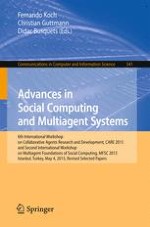2015 | Book
Advances in Social Computing and Multiagent Systems
6th International Workshop on Collaborative Agents Research and Development, CARE 2015 and Second International Workshop on Multiagent Foundations of Social Computing, MFSC 2015, Istanbul, Turkey, May 4, 2015, Revised Selected Papers
Editors: Fernando Koch, Christian Guttmann, Didac Busquets
Publisher: Springer International Publishing
Book Series : Communications in Computer and Information Science
